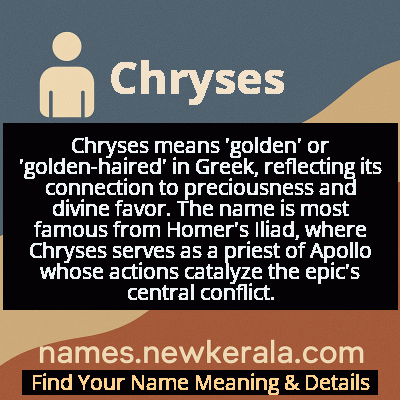Chryses Name Meaning & Details
Origin, Popularity, Numerology Analysis & Name Meaning of Chryses
Discover the origin, meaning, and cultural significance of the name CHRYSES. Delve into its historical roots and explore the lasting impact it has had on communities and traditions.
Name
Chryses
Gender
Male
Origin
Greek
Lucky Number
7
Meaning of the Name - Chryses
Chryses means 'golden' or 'golden-haired' in Greek, reflecting its connection to preciousness and divine favor. The name is most famous from Homer's Iliad, where Chryses serves as a priest of Apollo whose actions catalyze the epic's central conflict.
Chryses - Complete Numerology Analysis
Your Numerology Number
Based on Pythagorean Numerology System
Ruling Planet
Neptune (Ketu)
Positive Nature
Intuitive, analytical, spiritual, and inquisitive.
Negative Traits
Secretive, reserved, aloof, and can be overly critical.
Lucky Colours
Green, yellow.
Lucky Days
Monday.
Lucky Stones
Cat’s eye, moonstone.
Harmony Numbers
1, 5, 6.
Best Suited Professions
Scientists, researchers, spiritual leaders, detectives.
What People Like About You
Depth of knowledge, analytical skills, spirituality.
Famous People Named Chryses
Chryses of Troy
Mythological Priest
Catalyst for the Trojan War conflict in Homer's Iliad
Chryses of Colophon
Ancient Poet
Early Greek lyric poet from Ionia
Chryses of Mycenae
Mythological Figure
Associated with golden fleece mythology
Name Variations & International Equivalents
Click on blue names to explore their detailed meanings. Gray names with will be available soon.
Cultural & Historical Significance
The cultural legacy of Chryses extends beyond his narrative function to represent the enduring Greek cultural values of piety, familial devotion, and the belief that moral order is maintained through proper religious observance. His successful appeal to Apollo reinforces the cultural understanding that the gods actively participate in human affairs and that religious figures serve as vital intermediaries between the mortal and divine realms. The name Chryses has become synonymous with righteous indignation and the power of spiritual conviction to effect change, serving as a cultural touchstone for discussions about the relationship between personal faith and public justice throughout Western literary history.
Extended Personality Analysis
Individuals bearing the name Chryses typically exhibit a personality characterized by deep conviction, spiritual awareness, and a strong moral compass. Like their mythological namesake, they often possess an innate dignity and authority that commands respect without being overtly assertive. Their thinking tends to be principled and consistent, guided by deeply held beliefs rather than fleeting emotions or popular opinion. They demonstrate remarkable persistence when pursuing justice or defending their values, showing the same determination that the priest displayed in reclaiming his daughter from Agamemnon. Their connection to tradition and history often makes them thoughtful, contemplative individuals who value wisdom over immediate gratification.
In interpersonal relationships, those named Chryses are typically loyal and protective, especially toward family and those under their care. They possess the persuasive abilities of their namesake priest, able to articulate their positions with clarity and conviction. However, they may sometimes struggle with flexibility, as their strong principles can make compromise difficult. When wronged, they tend to respond not with immediate aggression but with strategic, well-considered action - much like Chryses who turned to divine intervention rather than direct confrontation. Their combination of spiritual depth, intellectual rigor, and emotional resilience makes them natural leaders in causes they believe in, though they may prefer to work behind the scenes rather than seeking public recognition.
Modern Usage & Popularity
In contemporary naming practices, Chryses remains an extraordinarily rare choice, primarily confined to academic families, Greek cultural traditionalists, or parents deeply fascinated by classical mythology. The name has never achieved mainstream popularity and is absent from modern birth registries in most countries. Its usage is largely symbolic, chosen for its profound literary and historical associations rather than its phonetic appeal or modern relevance. Recent years have seen a minor resurgence of interest in obscure mythological names, but Chryses faces significant barriers to widespread adoption due to its unfamiliar sound to non-Greek speakers, complex mythological background, and strong identification with a specific character rather than a general archetype. It exists primarily as a scholarly curiosity rather than a viable contemporary given name, though it occasionally appears in literary contexts or as a middle name honoring classical education or Greek heritage.
Symbolic & Spiritual Meanings
The name Chryses carries rich symbolic meaning derived from both its etymological roots and mythological narrative. Literally meaning 'golden' or 'of gold,' it symbolizes not material wealth but spiritual richness, divine favor, and inherent value. The golden quality represents purity of purpose, enlightenment, and connection to the divine - attributes embodied by Apollo, the god whom Chryses served. Symbolically, Chryses represents the power of righteous cause over military might, demonstrating that spiritual authority can triumph over temporal power when aligned with cosmic justice. His story serves as an enduring metaphor for how individual integrity, when coupled with proper religious observance, can overcome even the most formidable opposition.
Metaphorically, Chryses embodies the archetype of the catalyst - the seemingly minor figure whose actions trigger monumental consequences. His character symbolizes the interconnectedness of human and divine realms, the importance of respecting sacred boundaries, and the transformative potential of steadfast faith. The plague that Apollo sends in response to Chryses' prayers represents the inevitable consequences of violating moral and religious principles, making the name a symbolic reminder that hubris inevitably meets its nemesis. In broader cultural terms, Chryses has come to represent the enduring power of fatherly love, the sanctity of family bonds, and the moral authority that comes from alignment with higher principles rather than temporal power.

